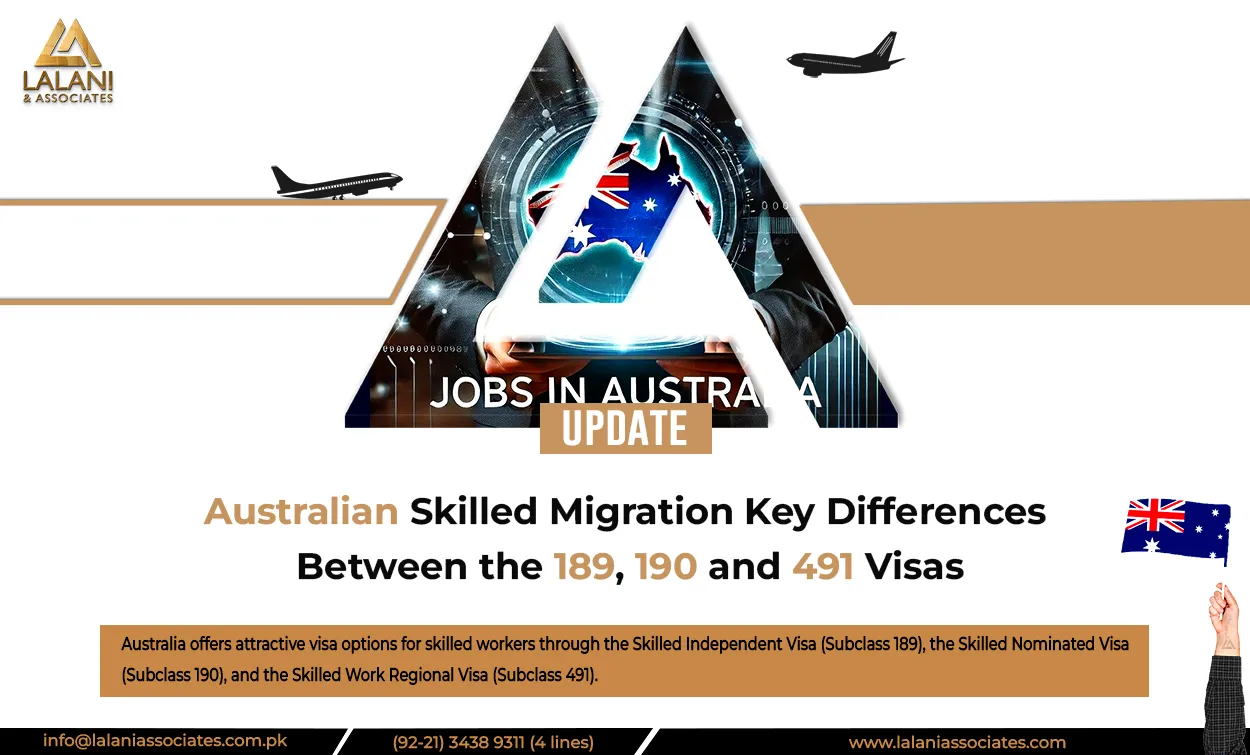
Australia is a popular destination for skilled professionals seeking new opportunities and a high quality of life. The country’s immigration system offers several visa options to skilled workers who meet specific criteria, enabling them to live and work in Australia. The most prominent options for skilled workers are the Skilled Independent Visa (Subclass 189), the Skilled Nominated Visa (Subclass 190), and the Skilled Work Regional Visa (Subclass 491). This article will provide a detailed overview of each visa subclass, including eligibility criteria, application processes, and key benefits.
Skilled Independent Visa (Subclass 189)
The Skilled Independent Visa (Subclass 189) is a permanent visa designed for highly skilled workers who wish to migrate to Australia. This visa allows individuals to live and work anywhere in the country, with no requirement for state or employer sponsorship.
Key Advantages:
• • Permanent Residency: The 189 visa provides permanent residency, allowing individuals to live, work, and study in Australia indefinitely.
• • Multiple Entries: Visa holders can enter and exit Australia freely.
• • Family Sponsorship: Visa holders may sponsor eligible family members for Australian permanent residency.
• • Pathway to Citizenship: After fulfilling residency requirements, visa holders may apply for Australian citizenship.
Eligibility Criteria:
• • Points Test: Applicants must score a minimum of 65 points based on factors such as age, English proficiency, education, and work experience.
• • Occupation: The applicant’s occupation must be listed on the Skilled Occupation List (SOL), which highlights occupations in demand in Australia.
• • Skills Assessment: A skills assessment from a relevant assessing authority is required for the nominated occupation.
• • Expression of Interest (EOI): Applicants must submit an EOI via the SkillSelect system, and once invited, they can apply for the visa.
• • Age Requirement: Applicants must be between 18 and 44 years old.
• • Other Requirements: Applicants must meet English language proficiency, health, and character standards.
Skilled Nominated Visa (Subclass 190)
The Skilled Nominated Visa (Subclass 190) is a permanent residency visa aimed at skilled professionals who are nominated by an Australian state or territory. This visa requires individuals to live and work in the nominating state or territory for a specific period.
Key Advantages:
• • Permanent Residency: The visa grants permanent residency, allowing applicants to live and work in Australia indefinitely.
• • Healthcare: Visa holders have access to Medicare, Australia's national health insurance scheme.
• • Family Sponsorship: Eligible family members can be sponsored for permanent residency.
• • Citizenship: After meeting residency requirements, applicants can pursue Australian citizenship.
• • Regional Freedom: After completing two years in the nominating state, individuals can move freely across Australia.
Eligibility Criteria:
• • State/Territory Nomination: Applicants must be nominated by an Australian state or territory government.
• • Points Test: A minimum score of 65 points is required. Points are awarded based on factors such as age, education, English proficiency, and work experience.
• • Occupation: The nominated occupation must appear on the State/Territory Skilled Occupation List.
• • Skills Assessment: Applicants must undergo and pass a skills assessment for their nominated occupation.
• • Age: Applicants must be under 45 years of age at the time of EOI submission.
• • Other Requirements: English proficiency, health, and character checks are mandatory.
Skilled Work Regional Visa (Subclass 491)
The Skilled Work Regional Visa (Subclass 491) is a temporary visa intended for skilled workers who are nominated by an Australian state/territory or sponsored by an eligible family member residing in a designated regional area of Australia. This visa is designed to promote regional development by encouraging migration to less populated regions of the country.
Key Advantages:
• • Temporary Residency: The visa allows individuals to live, work, and study in designated regional areas of Australia for five years.
• • Pathway to Permanent Residency: After living and working in a regional area for at least three years, visa holders can apply for the Permanent Residence (Skilled Regional) Visa (Subclass 191).
• • Family Inclusion: Immediate family members can be included in the visa application.
• • Multiple Entries: Visa holders can travel to and from Australia multiple times while the visa is valid.
Eligibility Criteria:
• • Nomination or Sponsorship: Applicants must be nominated by a state or territory government or sponsored by an eligible relative living in regional Australia.
• • Points Test: Applicants must score at least 65 points based on factors such as age, English proficiency, qualifications, and work experience.
• • Skills Assessment: A skills assessment for the nominated occupation is required.
• • Age: Applicants must be under 45 years old at the time of invitation.
• • Other Requirements: Applicants must meet English language proficiency, health, and character standards.
How the Points System Works
All three visa subclasses (189, 190, and 491) rely on a points-based system to assess eligibility. Points are awarded based on several factors, including:
1) Age: Maximum points are awarded to applicants between 25 and 32 years old.
2) English Language Proficiency: Higher points are given for superior English language skills.
3) Skilled Employment: Points are allocated for skilled work experience both in Australia and overseas.
4) Educational Qualifications: Higher-level qualifications, such as a bachelor's degree or higher, attract more points.
5) State Nomination: (for Subclass 190 and 491): Points are awarded for receiving a state or territory nomination.
Conclusion
Australia offers attractive visa options for skilled workers through the Skilled Independent Visa (Subclass 189), the Skilled Nominated Visa (Subclass 190), and the Skilled Work Regional Visa (Subclass 491). Each visa subclass has its own benefits, eligibility criteria, and pathways to permanent residency and citizenship. Skilled professionals interested in these visa programs should carefully assess their eligibility and begin the application process by submitting an Expression of Interest (EOI) through the SkillSelect system.


0 Comments